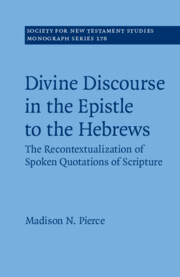 Divine Discourse in the Epistle to the Hebrews
Divine Discourse in the Epistle to the Hebrews Book contents
- Divine Discourse in the Epistle to the Hebrews
- Society for New Testament Studies
- Divine Discourse in the Epistle to the Hebrews
- Copyright page
- Dedication
- Contents
- Acknowledgments
- 1 The Author’s Exegetical Method and Speech in Hebrews
- 2 Intra-Divine Discourse (1)
- 3 Intra-Divine Discourse (2)
- 4 Extra-Divine Discourse
- 5 Divine Discourse and the Structure of Hebrews
- 6 Conclusion
- Bibliography
- Scripture and Primary Source Index
- Secondary Source Index
- Subject Index
4 - Extra-Divine Discourse
The Holy Spirit Speaks to the Community
Published online by Cambridge University Press: 14 August 2020
- Divine Discourse in the Epistle to the Hebrews
- Society for New Testament Studies
- Divine Discourse in the Epistle to the Hebrews
- Copyright page
- Dedication
- Contents
- Acknowledgments
- 1 The Author’s Exegetical Method and Speech in Hebrews
- 2 Intra-Divine Discourse (1)
- 3 Intra-Divine Discourse (2)
- 4 Extra-Divine Discourse
- 5 Divine Discourse and the Structure of Hebrews
- 6 Conclusion
- Bibliography
- Scripture and Primary Source Index
- Secondary Source Index
- Subject Index
Summary
This chapter examines passages in Hebrews where the Spirit is portrayed as the speaker of Scripture quotations (Heb 3:7–4:11; 10:11–18). Due to previous skepticism about the Spirit’s role in Hebrews, this chapter also argues that the Spirit is a speaker in the same way as the Father and Son and that the author uses his speech to develop a thoroughly distinct divine character. In Hebrews 3-4, potentially the longest pneumatological discourse in the NT, the Spirit encourages the addressees to avoid the error of the wilderness generation and press on towards rest. In Hebrews 10, the Spirit “testifies” to the benefits of the new covenant - especially forgiveness. In contrast to the Father and Son, the Spirit’s conversation partner is “us.”
- Type
- Chapter
- Information
- Divine Discourse in the Epistle to the HebrewsThe Recontextualization of Spoken Quotations of Scripture, pp. 135 - 174Publisher: Cambridge University PressPrint publication year: 2020
